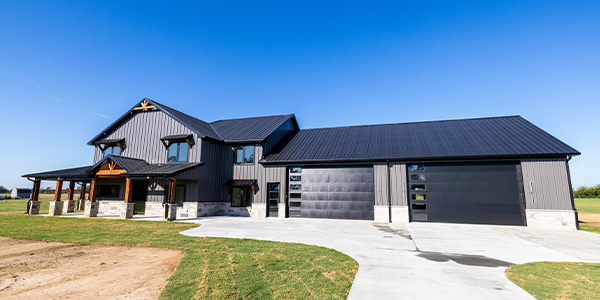Homebuyers
What You Need to Qualify for USDA Financing
August 19, 2024
Do you want to put down roots in a rural area? The U.S. Department of Agriculture Rural Development Guaranteed Housing Loan Program offers mortgage loans to rural property buyers who meet eligibility criteria. USDA mortgages make it possible to obtain low interest rates with no money required for a down payment. Understanding eligibility criteria for USDA financing is essential if you think this path might be your route to homeownership. Here's what you need to qualify for USDA financing.
USDA Loan Requirements and Eligibility
The goal of the USDA loan program is to make homeownership a possibility for low-income and moderate-income households seeking to build, rehabilitate, or improve single-family homes in eligible rural areas using 100% financing. As a government-backed program, the USDA loan program reduces risks for lenders by guaranteeing 90% of a loan note. The following factors must be in place to be approved for a USDA mortgage:
- The property must be located in a USDA-approved rural area.
- The borrower must be working with a USDA-approved lender.
- The borrower must meet income criteria.
- The home must be structurally sound enough to meet certain guidelines.
Location Requirements
To qualify for a USDA rural mortgage, a property must fall within a rural area that has been determined by the U.S. Department of Agriculture. This typically means that the property is located outside of a city or metro area. However, portions of some suburbs may be considered rural. You can search a property's address using the USDA's eligibility map. Just keep in mind that a property's rural status is subject to final approval by the USDA.
Condition and Quality of the Home
USDA loans can be used to purchase a variety of different homes that will be used as primary residences. This includes existing homes, manufactured homes, townhouses, condos, and new constructions. Short sales and foreclosure homes can also be eligible.
Appraisals are required for USDA financing. An appraisal must show that a home meets the following requirements:
- Has a structurally sound foundation.
- Has a good roof.
- Can be easily accessed from the road.
Systems and Functionality
In addition to being structurally sound, a home must also have all major systems intact and functioning to be approved for a USDA loan. The most important requirements are functional heating and cooling systems, electrical systems, and plumbing systems. If a home has a well and septic system, they must also be in working order.
Major Disqualifying Factors for USDA Home Financing
Major structural and safety issues are the most common reasons why homes are disqualified from USDA home financing. These can include foundation issues, a major issue affecting the home's frame, or severe damage to walls and roofing. These loans can also be denied based on safety hazards that might include mold infestations, the presence of lead-based paint, or the discovery of environmental contaminants on the property. These rules are in place to protect buyers from purchasing homes that contain hidden dangers that would simply be too unaffordable to repair.
Income and Property Price Caps
To meet USDA loan income requirements, you can make either 115% of the U.S. median family income or 115% of the average statewide and state non-metro median family income. In 2024, the annual income limit for a household with five to eight members is $146,050. There is no minimum credit score for USDA loans. However, lenders generally impose their minimum requirements.
When researching what you need to qualify for USDA financing, you should know that there is also a cap for maximum property price for USDA loans that is determined by county. In most counties around the country, the cap is $398,600. You can search for loan limits in a specific county using the USDA's map.
Non-Compliance with Safety and Sanitation Standards
As shared above, a structural issue isn't the only finding that can get a USDA loan denied. Anything that would make a property unsafe can be a cause for rejection. This often includes the presence of banned lead products, peeling paint, mold, or termite infestations. Other hazards that can get a mortgage denied include missing railings, visibly deteriorating porches and decks, missing siding, exposed wiring, uncovered outlets and light switches, and inaccessible crawl spaces. On the sanitation side, a mortgage for a home with a nonfunctional plumbing or septic system can also be denied.
Ineligible Property Types
A USDA loan can only be used for a home that will be a primary residence. Farms, rental properties, second homes, and vacation homes are disqualified. Additionally, barns, silos, and any income-producing buildings are also excluded from this type of financing.
How to Address Disqualifying Factors
A home may still qualify for financing if necessary repairs can be made before closing. If a property fails a USDA inspection, the buyer has the option to ask the seller to make necessary repairs using a formal communication process between the buyer's agent and the seller's agent. If the seller refuses, the buyer may agree to fund the repairs on their own. In some cases, USDA loan funds can be used to make repairs.
Navigating the Appraisal Process for USDA Loans
Home appraisals for USDA loans are conducted by USDA-approved appraisers. The core checklist items during the inspection include:
- The property is located in a USDA-eligible rural area.
- The property is accessible from a road or driveway.
- The property is compliant with all local zoning restrictions.
- The property lacks any income-producing structures or land.
- Heating, cooling, and electrical systems are properly functioning.
- Plumbing and waste-removal systems are working.
- There are no signs of a termite infestation.
- Utilities are working.
- All local code requirements are being followed.
Common issues flagged during USDA appraisals include peeling or flaking paint, nonworking plumbing systems, and broken appliances. By having your buyer's agent communicate what's required to pass inspection to the seller's agent, the seller can either make the necessary updates or negotiate to get the updates done before appraisal and inspection.
Preparing Your Home for USDA Financing
Do your homework on what's required to qualify for a USDA mortgage before you begin your search for a new home. As you tour each home you're considering, use a checklist to mark any details that could be flagged during the appraisal. Real estate experts stress the idea that collaborating with the seller is so important when making a property compliant with USDA loan requirements.
Alternative Financing Options if Disqualified
You may still be able to finance the purchase of a home if it doesn't qualify for a USDA loan. Potential alternatives include:
Conventional loans are approved primarily based on the borrower's financial situation instead of a property's eligibility. Conventional loans also aren't as rigid when it comes to the type or location of the property. Qualifying borrowers can put down as little as 3% if they agree to pay PMI (private mortgage insurance).
While FHA loans are intended for primary residences in the same way that USDA loans are, they can be used to purchase properties in all locations. When looking at USDA vs FHA loans in terms of down payment, some qualifying FHA borrowers can put down as little as 3.5% if they agree to pay mortgage insurance. USDA loans are similar to VA loans because both allow qualifying borrowers to put down 0%. VA loan limits are often much higher compared to USDA loan limits.
FAQs
What are the most common reasons homes fail USDA appraisals?
Structural issues, foundation cracks, and unstable frames are all common reasons why USDA appraisals are denied. A loan application may also be rejected if an appraisal or inspection reveals that a home does not have working electrical or plumbing systems.
Can I reapply for USDA financing after making the necessary repairs?
Yes, applicants are free to reapply for USDA loans after being rejected for any reason. A borrower can also consider applying for other loan types.
Are there exceptions to USDA's disqualifying criteria?
While the USDA doesn't make exceptions for disqualifying criteria, loan denials can be appealed to the National Appeals Division at the National Appeals Division (NAD) of the USDA to have a situation looked at on a case-by-case basis.
Sources:
- https://www.rd.usda.gov/media/file/download/rd-sfh-faqloanorigination.pdf
- https://www.rd.usda.gov/files/3550-1chapter05.pdf
- https://eligibility.sc.egov.usda.gov/eligibility/welcomeAction.do
- https://ask.usda.gov/s/article/Will-USDA-make-an-exception-to-a-rule-or-regulation-for-me-regarding-my-USDA-Direct-home-loan-application-if-it-is-rejected








 Smart Moves Start Here.
Smart Moves Start Here.